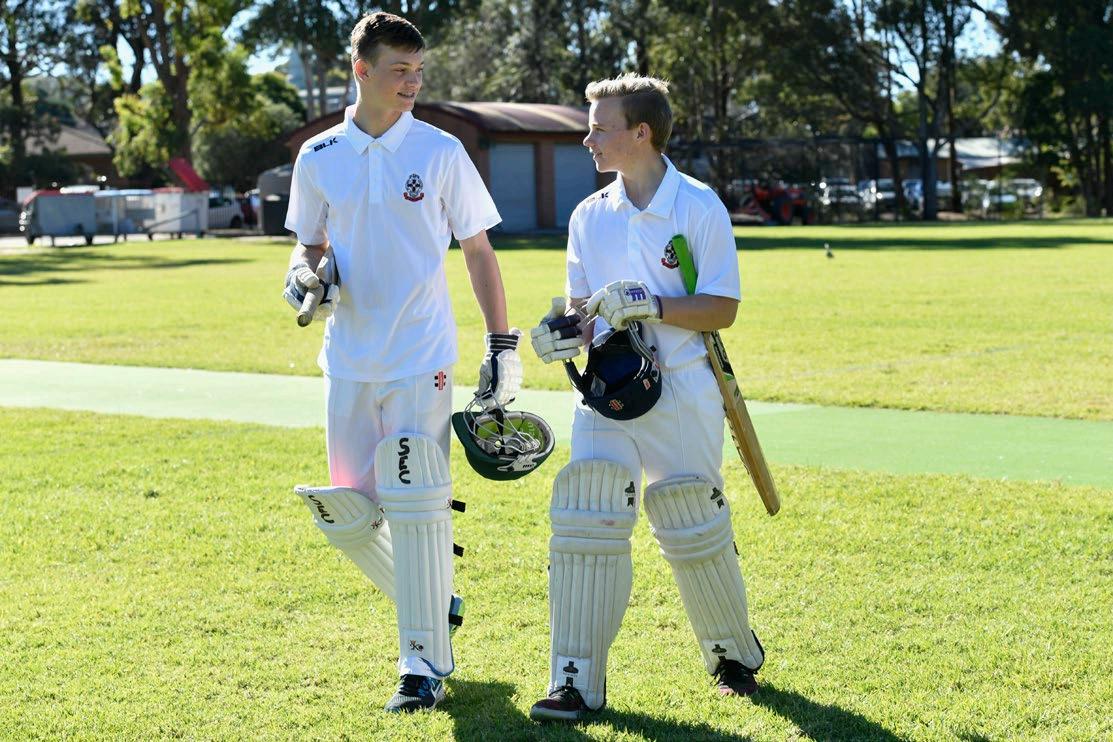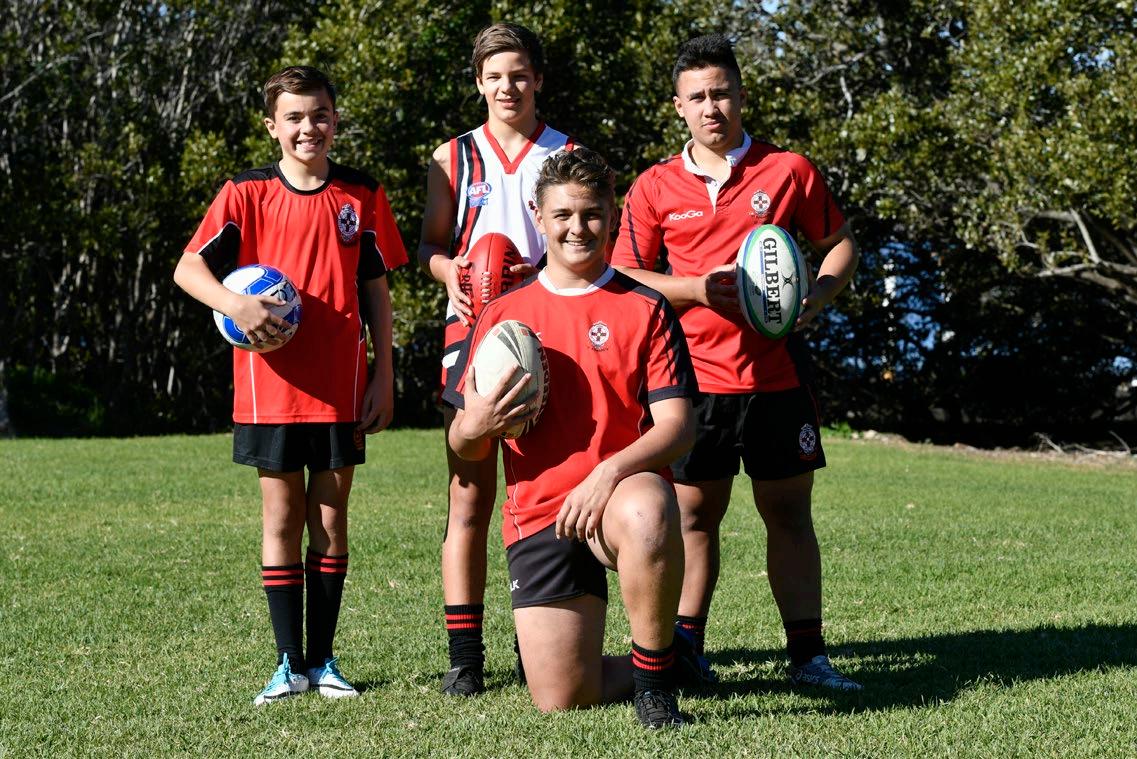
8 minute read
Liberating Education
Home Room
Home Room groups consist of approximately 27 students made up from Years 7 to 12. In most cases, students will remain in the same group throughout their time at the College.
Senior students are given the opportunity to care for and help younger students; they in turn get to know older students in a friendly and supportive atmosphere. The inter-relationship helps promote a positive spirit throughout the College.
Each day commences with Home Room, the attendance roll is marked, and students are informed of any important notices, this includes notifying students of opportunities to represent the College in sporting or other activities. Any unexplained absences will be followed up via an SMS message. Parents are then asked to email, text or call informing the College of their son’s absence. If parents choose not to respond using any of these options, an absentee note will need to be provided on the student’s first day of return.
Liberating Education
College Staff
Staff Member Executive Staff Mark Bonnici Jay Sutton Ron Featherston Anthony Beacroft Jodie Connor Jackson English Paul English Craig Friend Chris Millar Carolina Murdoch Gerard Summerhayes Pastoral Care Team Paul English Heidi Englund Robert Speziale Paul Sullivan Scott Beattie Alex Powell Eammon McCauley Anthea Pearson
Terase Killin Marcus Missio-Spiteri Position
Principal Deputy Principal Business Manager Director of Mission and Identity Director of Professional Learning Director of Administration Director of Pastoral Care Manager Information Technology Director of Enrolments and Marketing Director of Teaching and Learning Director of Curriculum
Director of Pastoral Care Year 7 Pastoral Leader Year 8 Pastoral Leader Year 9 Pastoral Leader Year 10 Pastoral Leader Year 11 Pastoral Leader Year 12 Pastoral Leader Wellbeing Leader
College Counsellor College Counsellor
Student Handbook |
10
Leaders of Learning Mark Austin Elissa Bailey Lachlan Butt Jason Carpenter Patrick Dell Juliana Dignam Sarah Evans Trent Foster Greg Hannelly Vanessa Henderson Betty Kiekebosch Anne McDonald Michelle McDonald Sarah Moulton Elsa Ribal-Vigneau Paul Toole Fran Toomey Matthew Young TAS Literacy Integrator Mathematics Sport Social Justice Careers/VET Visual Arts Science HSIE PDHPE Diverse Learning Food Technology English Library Language Music Religious Education Information Technology
College Facilities
Mona Vale
Wellbeing Centre
Administration Centre
Edmund Rice Centre
Br M D Shanahan Learning Centre
Trade Training Centre
Quadrangle Finance
Enrolments Pastoral Care Counsellors
Reception
Sports Complex Function Foyer
Library Theatre Music
Metal and Engineering Construction Compound Commercial Kitchen
General Learning Area’s Science Laboratories Food Technology/Hospitality Facility

Student Handbook |
11
Brother M D Shanahan Learning Centre
The Shanahan Learning Centre is central to implementing, enriching and supporting the teaching and learning programs within the College. It is proactive in developing information literate students and supporting an information literate community. To this end, it offers a lot more than just books as we have adapted to the demands of innovation and digital literacy in the accessing of information and recording of information.
Within the Centre, students are encouraged to think deeply, find information, evaluate it and then decide on the best platform for this to be shared. The students are taught how to access digital resources and to develop their personal research techniques. In their recreational time in the Centre, students are encouraged to undertake research for assessment tasks using our digital databases, Libguides and online encyclopaedias as well as borrow books for leisurely reading. They are also encouraged to attend various clubs such as coding and use iPads for making moving movies and book trailers. The Library is open every day from 8am and closes at 4pm. Students are also supported in the morning with teacher assistance for homework and assessment tasks.
Sporting Facilities
The College has considerable grounds, including:

1 rugby league/union oval 1 football/soccer combination oval 1 cricket oval with synthetic turf wicket 2 cricket training nets with synthetic turf wickets 2 outdoor asphalt basketball courts 2 long jump pits 2 concrete discus/shot-put circles Undercover tiered grandstand Shade structure for sport spectators Undercover bus shelter area Central quadrangle with 6 handball courts and shade structures for shelter


Student Handbook |
12
Code for Learning
The College Code for learning is designed to provide clear guidelines of the behavioural and performance expectations of students at St Edward’s College. This code was established in 2010 through a process of student lead consultation and provides clear guidelines for students in relation to their application and effort in relations to all aspect of their study. Students are provided with opportunities throughout the year to establish learning goals, which are aligned with these expectations and are guided by their teachers on ways in which they can work to achieve these goals.
Parents are provided with an indication of student performance in relation to the Code for learning in the Interim and Semester Reports. Parents are encouraged to engage in conversations with their son on the information provided in these reports and their learning goals for the year.
At St Edward’s we encourage all students to strive to achieve their personal best in all endeavours and the Code for learning and associated goal setting advice is designed to encourage students to take greater responsibility for their learning. Student application and effort in class is of prime importance at St Edward’s and participation in all extra-curricular activities that the College offers is dependent on each student’s efforts in this regard. Students wishing to represent the College in any sporting teams or attend excursions and camps must ensure that their focus in the classroom is meeting the expectations outlined in the Code for learning. Student’s whose application and effort does not meet these expectations will be provided with advice and guidance on how to bring about the required improvement.
I respect learning by valuing:
Organisation
Cooperation
The right to learn
Participation
Independent study
Academic excellence I show commitment to learning through:
Being prepared and punctual Managing my time effectively Meeting my deadlines
Following instruction Working cooperatively with teachers and other students Helping others
Paying attention Not disturbing others Not being disrupted by others
Being actively involved Asking and answering questions Listening and completing assigned work
Developing an effective study routine Completing my homework Researching, reading and revising regularly
Doing my personal best Showing pride in my work Setting and trying to achieve goals

Student Handbook |
13
Subjects Studied
Throughout Years of 7 to 10, students at St Edward's College are provided with a balanced program of study. While the courses in Years 7 and 8 are compulsory for all students, the program of study in Years 9 and 10 allows for some choice of courses.
Students in Year 7 study the following subjects:
Religious Education English Mathematics Science History Geography Technology Music Visual Arts Personal Development, Health and Physical Education
Students in Year 8 study the above subjects as well as French.
All students in Years 9 and 10 study the following subjects:
Religious Education English Mathematics Science History, Geography, Civics and Citizenship Personal Development, Health and Physical Education
In addition, students choose two other subjects from those offered in any given year. In recent years students have been asked to choose to study two subjects from Commerce, Industrial Technology (Timber and Metal), Graphics Technology, Design and Technology, French, Music, PE and PASS (Physical Activity and Sport Studies), Food Technology, Drama, Information and Software Technology, Construction, Marine Studies, Visual Arts, Photographic and Digital Media. Classes are formed each year in most of these subjects although, from time to time, a subject does not attract sufficient numbers to be offered.
Textbooks
All textbooks are supplied by the College, as required. It is expected that all textbooks are returned at the end of each year (or as requested) in a condition that reflects normal wear and tear. Textbooks that are lost or damaged will need to be repaired or replaced at the cost of the student.
Personal Learning Device
St Edward’s College is committed to provide learning environments that will engage our students and give them some independence and flexibility in their learning.
Since 2018, the Personal Learning Device program (PLD) was introduced providing every Year 7 student access to their own laptop computer in a wireless environment. From 2021, students across Year 7 to 12 will have access to their own laptop computer.

Student Handbook |
14
The College’s aim is to enable students to learn in teams, collaboratively, as a class, a whole community or individually. This allows them to share learning experiences with other students and/or the wider community.
In particular, students use their personal devices to research, complete homework, problem-solve, email, academic coursework and be involved in team projects. At the same time, they gain valuable skills that will be beneficial throughout their lives and careers. For example, a touch-typing tutor will be installed on each laptop and students will set and work towards targets throughout the year. Activities involving handwriting will still form part of their learning process.
Stationery
Year 7 students will be issued with a stationery pack on their first day. This pack will include:
A4 exercise books Grid mathematics book A4 display folders Highlighters Lead pencils Coloured pencils Geometry set Glue stick Ruler Eraser Scissors Sharpener Pens Calculator Headphones TAS apron TAS safety glasses
Home Study
Homework refers to all work teachers expect students to do out of College hours, i.e. assignments, daily homework, preparation for tests, reading of set texts, and study for examinations. Educational research indicates that homework has an important role to play in the learning process. The amount of homework set will vary from teacher to teacher and subject to subject. It will also range from work to be completed in one night, work to be completed over a few nights to longer assignments requiring two or more weeks to complete.
Assistance is offered Monday to Friday from 8am to 8.45am in the library to support students with their homework and assessment tasks.
Aims of Homework
Homework at St Edward’s College has the below goals:
to reinforce, consolidate and improve skills taught in class to encourage good study habits to develop self-discipline and independent learning, and to extend students beyond the work normally taught in class

Student Handbook |







